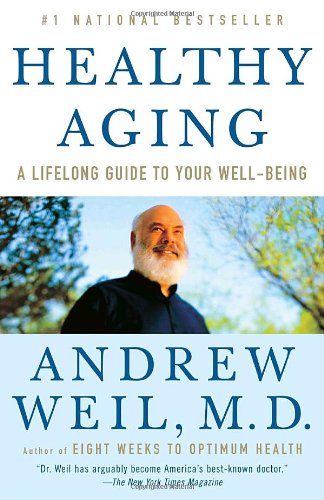Books |
Healthy Aging: A Lifelong Guide to Your Physical and Spiritual Well-Being
Andrew Weil
By
Published: Jun 19, 2023
Category:
Health and Fitness
Andrew Weil is America’s best-known revolutionary. You know him as a doctor — a pioneer in what he calls Integrative Medicine — who gets around in the very best media circles. Like the cover of Time Magazine, where he looks like a jolly Santa, with his bald head, big grin and a white beard just long enough to make you think he may someday play in ZZ Top. He’s a very reassuring guest on talk shows, where he speaks in praise of common sense and treatments that work, whatever their source. But don’t be fooled — Andrew Weil is a bomb-thrower.
“Healthy Aging: A Lifelong Guide to Your Physical and Spiritual Well-Being” is a bomb that may come as a shock to Boomers — who tend to believe that life started with them and cannot go on without them — and a total surprise for Millennials. Its newsflash: We all will die. There is no “fountain of youth,” no magic elixir that extends life. In 2002, when Weil turned sixty, he noted what that means: “Sixty is about the time that organs of the body begin to fail, when the first signs of age-related disease begin to appear.”
Can aging be reversed? No. But here comes the second bomb Dr. Weil throws in these pages — and from his point-of-view, it’s pure good news: You can age gracefully. And if you are smart and careful and active and lucky, you will “live as long and as well as possible, then have a rapid decline at the end of life.” That is, you’re healthy and vital right into your ’80s and ’90s, and then you get sick and die quickly, with your dignity — and your wits — intact. “The goal,” he reminds us, “is compression of morbidity, not life extension.”
How does he know? Well, he’s studied widely. And he’s seen his own mother — who went to Antarctica at 89 — die at the end of a happy day when she was 93. [To buy the paperback from Amazon, click here. For the Kindle edition, click here.]
That personal story is welcome because it’s a stark contrast to the rest of the book, which is unusually technical for Dr. Weil. But you’ll want to slog through it. First, because it is your life — a subject of plausible interest to you — he’s talking about. Second, because the science is in support of some very blunt statements about how to live and eat and medicate.
Among the new ideas I encountered in these pages:
— Vitamins C and E and green tea extract “block and perhaps undo” some of the skin damage caused by the sun’s ultraviolet rays.
— “Those who are somewhat overweight in middle age may enjoy a healthier and longer old age than those who are not — it is better to be fit and fat than lean and not fit.”
— Buy oils in small quantities.
— Avoid all products containing high-fructose corn syrup.
— The least processed tea is white tea from China. To remove most caffeine from tea, steep the tea in hot water for 30 seconds, then use the tea leaves (or bag) in your cup or pot. [To buy white tea leaves from Amazon, click here. For white tea bags, click here.]
— Take Vitamin E daily — it offers “the best antioxidant protection against common age-related diseases.” [To buy Vitamin E from Amazon, click here.]
— Take Vitamin C. daily. NOTE: I’m an advocate for Lypo-Spheric Vitamin C.
— If you are taking a statin, you should also take 60 milligrams a day of CoQ10. [To buy COQ10 from Amazon, click here.]
— Turmeric may help prevent Alzheimer’s disease. [To read about Turmeric on Head Butler and buy it from Amazon, click here.]
— DHEA “decreases abdominal fat in elderly men and women.” [To buy DHEA from Amazon, click here.]
There’s much more. And then there’s this: “The magnificence of autumn foliage is the ripe period of the year, before the sleep of winter.”


